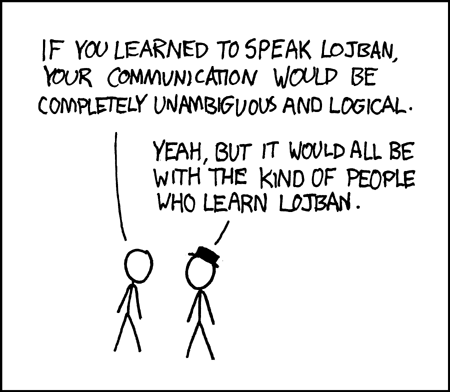There are two aspects of the French language that they apparently still don't teach in schools. The first is that nobody says "nous" anymore, people say "on" when they're talking about their group. So, insteal of "Nous nous rendons," say "On se rend." And the second is that they've figured out that "ne ___ pas" is a bit redundant, so people don't say "ne" aloud very often in their negatives. So after you've attempted to order your dinner, your waiter will say simply "Je comprends pas".
I have a little trouble with this second one, because it means I have to pay a bit more attention. Four negative expressions come immediately to mind. Two of them are easy, because they don't mean anything else most of the time. But the other two are still used as positive words, but they flip over.
"Il [ne] marche pas." "He doesn't walk." (Originally "not a step", now "not at all")
"Il [n']a rien." "He doesn't have anything, he has nothing." (Originally "not a thing", now "nothing")
"Il [ne] mange plus." "He's not eating any more." ("plus" actually still means "more")
"Il [n']y a personne." "There's nobody there." ("personne" actually still means "person")
Years ago, that last one made me wear out my VCR when French in Action tried to teach me that concept. They'd show a guy and say "C'est une personne," and then an empty stage and say, "C'est personne." I rewound it over and over trying to make sense of it. I eventually checked that sentence on Babelfish, and sacre merde, it really does mean "It's nobody." So one of these days, I'll have to parse that in a more complicated sentence.
I was fortunate enough to get ahold of John McWhorter's lecture series, "
The Story of Human Language", in which he explained how French got its weird negatives, through terms of emphasis that ended up taking over, as an example of "grammaticalization". As in the list above, "pas" used to mean "step", so people started saying "ne marche pas" for "doesn't walk a step", as "ne marche" was still correct but boring. Next thing you know, Fred didn't eat a step today, and Billy didn't work a step all year, and Ricardo doesn't drink a step because of what happened to his brother. But French doesn't have a big meaty word like "didn't" or "doesn't" or even "not"; it has a weak consonant and a weak vowel, so you might as well say Fred eats step, Billy works step, Ricardo drinks step.
It makes more sense if I substitute "jack", which is pretty damn close to "pas" in that it means "not" but used to be a noun, and eventually it meant "not" so much that it no longer needs the real "not". So Fred ate jack today, Billy worked jack all year, and Ricardo drinks jack because of what happened to his brother. Notice how one of these expressions is suddenly ambiguous?
Well, it's got to work in the long run, because France hasn't sank into the ocean yet. Probably the same way England didn't sink into the ocean from all the people who pronounce "can't" and "can" almost the same way.
Incidentally, has anyone here ever read an email where someone left out the word "not" entirely, and you could only tell because that sentence seemed to contradict everything else?
Super-incidentally, isn't it neat how the Japanese language saves the negative for the very end of the sentence, so you can have a long flowery sentence and then Wayne's World the whole thing?
